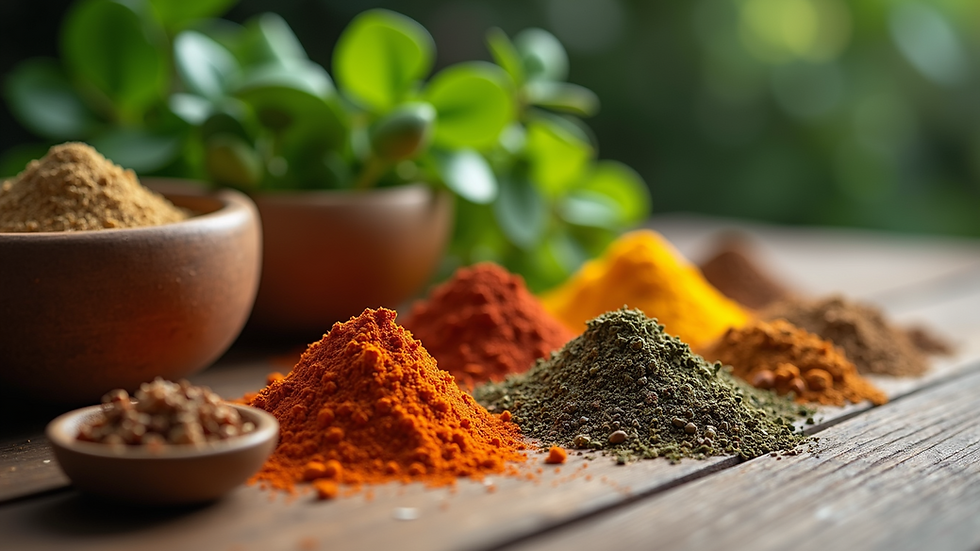Understanding the Principles of Ayurvedic Healing
- prexim
- Aug 6, 2025
- 4 min read
Ayurvedic healing is an ancient system of medicine that originated in India over 5,000 years ago. It focuses on balancing the body, mind, and spirit to promote overall health and well-being. Unlike conventional medicine, which often treats symptoms, Ayurveda aims to address the root cause of illness by understanding the unique constitution of each individual. This holistic approach uses natural remedies, lifestyle changes, and dietary adjustments to restore harmony within the body.
The Foundation of Ayurvedic Healing: The Three Doshas
At the core of Ayurvedic healing lies the concept of the three doshas - Vata, Pitta, and Kapha. These doshas represent different combinations of the five elements (earth, water, fire, air, and ether) and govern various physiological and psychological functions in the body.
Vata is composed of air and ether and controls movement, breathing, and circulation.
Pitta consists of fire and water and regulates digestion, metabolism, and energy production.
Kapha combines earth and water and is responsible for structure, lubrication, and stability.
Each person has a unique balance of these doshas, which determines their physical and mental characteristics. When the doshas are in balance, the body functions optimally. Imbalance, however, can lead to illness.
How to Identify Your Dosha
Understanding your dosha is the first step in Ayurvedic healing. You can identify your dominant dosha by observing your physical traits, emotional tendencies, and health patterns. For example:
Vata types tend to be thin, energetic, and creative but may experience anxiety and dry skin.
Pitta types are often medium-built, intelligent, and ambitious but prone to irritability and inflammation.
Kapha types usually have a sturdy build, calm demeanor, and good endurance but may struggle with weight gain and congestion.
Once you know your dosha, you can tailor your diet, exercise, and lifestyle to maintain balance.

Practical Applications of Ayurvedic Healing in Daily Life
Ayurvedic healing is not just about remedies; it is a lifestyle that encourages harmony with nature and self-awareness. Here are some practical ways to incorporate Ayurvedic principles into your daily routine:
Diet and Nutrition
Food is medicine in Ayurveda. Eating according to your dosha helps maintain balance and prevent disease.
Vata types benefit from warm, moist, and grounding foods like cooked grains, soups, and stews.
Pitta types should favor cooling, hydrating foods such as cucumbers, melons, and leafy greens.
Kapha types thrive on light, spicy, and dry foods like legumes, bitter greens, and ginger.
Avoid processed foods, excessive caffeine, and heavy meals that can aggravate your dosha.
Daily Routine (Dinacharya)
Establishing a consistent daily routine supports physical and mental health.
Wake up early, ideally before sunrise.
Practice self-massage (Abhyanga) with warm oils suited to your dosha.
Engage in moderate exercise like yoga or walking.
Meditate or practice breathing exercises to calm the mind.
Herbal Remedies and Therapies
Ayurveda uses a variety of herbs and natural therapies to restore balance. For example, turmeric is known for its anti-inflammatory properties, while ashwagandha helps reduce stress and improve vitality.
If you want to explore authentic Ayurvedic products and guidance, consider visiting ayurcare ayurvedic for expert advice and quality remedies.

The Role of Mind and Spirit in Ayurvedic Healing
Ayurveda recognizes that health is not just physical but also mental and spiritual. The mind and emotions significantly influence the body's balance.
Mental Health and Ayurveda
Stress, anxiety, and negative emotions can disrupt the doshas, especially Vata and Pitta. Ayurveda recommends practices such as:
Meditation to cultivate mindfulness and reduce stress.
Pranayama (breathing exercises) to regulate energy flow.
Mantra chanting to promote mental clarity and peace.
Spiritual Practices
Connecting with your inner self and the universe is essential for holistic healing. Ayurveda encourages:
Regular reflection and self-inquiry.
Spending time in nature to rejuvenate the senses.
Following ethical principles like truthfulness and compassion.
These practices help maintain emotional balance and support physical health.

Understanding Ayurvedic Healing Through Modern Science
In recent years, scientific research has begun to validate many Ayurvedic principles. Studies show that Ayurvedic herbs like turmeric, neem, and tulsi have potent antioxidant, anti-inflammatory, and antimicrobial properties.
Moreover, Ayurveda's emphasis on personalized medicine aligns with modern trends in healthcare, which focus on individualized treatment plans. The integration of Ayurveda with conventional medicine can offer comprehensive care, especially for chronic conditions like arthritis, diabetes, and digestive disorders.
How to Safely Integrate Ayurveda
Consult qualified Ayurvedic practitioners for diagnosis and treatment.
Inform your healthcare provider about any Ayurvedic supplements you use.
Use Ayurvedic remedies as complementary, not replacement, therapies.
This balanced approach ensures safety and maximizes benefits.
Embracing Ayurvedic Healing for a Balanced Life
Ayurvedic healing offers a timeless path to health by honoring the natural rhythms of the body and mind. By understanding your dosha, adopting mindful habits, and using natural remedies, you can achieve lasting wellness.
Whether you are seeking relief from specific ailments or simply want to enhance your vitality, Ayurveda provides practical tools for self-care. Explore the rich traditions and modern applications of this ancient science to nurture your body, mind, and spirit.
For those interested in authentic Ayurvedic guidance and products, ayurcare ayurvedic is a trusted resource to begin your healing journey.
Start today by observing your body's signals, making small lifestyle changes, and embracing the holistic wisdom of Ayurveda. Your path to balance and well-being awaits.




Comments